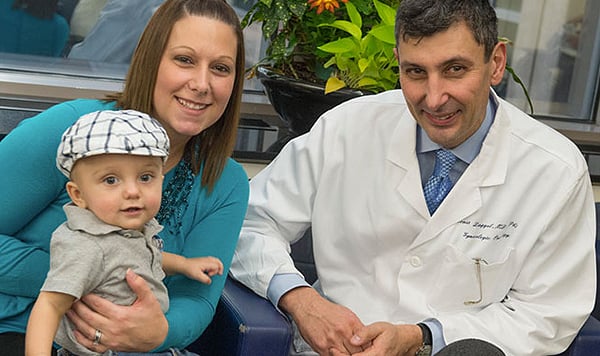Mom Strong: Celebrating survivor stories

Ernst Lengyel, MD, PhD, with patient Jennifer Zinga and her son Rocco at the Duchossois Center for Advanced Medicine (DCAM) Monday, Dec. 1, 2014, on the University of Chicago campus. (Robert Kozloff/The University of Chicago).
Not Ready to Give Up Hope
From the time she was young, Jennifer Mason Zinga knew she wanted to have three children. A mother of two at age 31, Zinga was well on the way to achieving her dream family. Then, she was diagnosed with early-stage cervical cancer in March 2012 -- just six months after her second son was born.
"Needless to say, my husband Tim and I were devastated by the news," said Zinga, a resident of North Lake, Ill. "In my heart of hearts, I knew three was our magic number."
Zinga and her husband turned to the University of Chicago Medicine's Ernst Lengyel, MD, PhD, an expert in a rare surgical procedure called a radical vaginal trachelectomy (RVT), an option that would allow Zinga to preserve fertility. Lengyel performed the procedure in June 2012, and Zinga was discharged from the hospital three days later with no complications.
One year after surgery, she and her husband learned they were pregnant.
"We were lucky to have another healthy son," Zinga said. "We know Dr. Lengyel is the only reason we have Rocco, our miracle baby.
Beating the Odds
When Sofia Espinoza arrived at her obstetrician's office in Bloomingdale, Ill., for a routine 24-week ultrasound, the second-time mom-to-be thought she knew what to expect. A few minutes into the appointment, that quickly changed. Her doctor noticed what appeared to be an abnormal growth on the baby's neck.
"Usually when you go for an ultrasound, everyone's so upbeat and eager to share the gender of the baby," said Espinoza, of Addison, Ill. "This time there was a scary silence in the room. I felt immediately that something must be wrong."
A few days later, a more detailed ultrasound confirmed the mass on the baby's neck was a cervical teratoma, a rare tumor that affects as few as 1 in 40,000 pregnancies. Espinoza was told the baby's best chance for survival would be a specialized cesarean section delivery called an ex utero intrapartum treatment, or EXIT.
"When I heard there were experts here in Chicago that had experience with teratomas, it felt like a tremendous weight was lifted," she said.
A multidisciplinary dream team was assembled at the University of Chicago Medicine to orchestrate the complicated delivery. Baby John Carlos was born a week early and, in an operation that lasted more than five hours, the tumor was successfully removed.
"His recovery has been truly amazing," Espinoza said. "When I saw the pictures of him with the tumor, I gasped. You just can't prepare yourself for that. But look at him now. He's definitely a survivor. Right away, he had so much spirit and fight in him. My dad says it's the strong bloodline. But I know we were lucky to find the right doctors." Read more.

From the Oncology Ward to the Maternity Ward
Jennifer Bishop-Staley had been looking forward to returning to college all summer. But three weeks before classes were to start, she discovered a mass on her left side that had grown so large and painful she could barely stand up straight.
Bishop-Staley's primary physician referred her to the University of Chicago Medicine, where she learned she had a tumor the size of a softball growing inside her left ovary. Diane Yamada, MD, lessened the blow. Yamada explained Jordan's ovaries could be spared and the eggs they held could be used for in vitro fertilization.
"It was pretty much right after surgery when my mom and I talked about how devastating this was and she said, 'I'll carry your baby for you,'" Jordan said.
Her mom, Cindy, continued to reassure her. "For me, being a parent is one of the greatest joys and accomplishments in life. For her to not have that opportunity -- the idea was devastating to me," Cindy said.
They were referred to Helen Kim, MD, director of in vitro fertilization in the department of obstetrics and gynecology at the University of Chicago Medicine. The medical team then walked them through every step from paperwork and progesterone shots to extracting Jordan's eggs, creating embryos in a lab and placing the embryos in Cindy's body. Once they were able to confirm a viable pregnancy, Cindy was on her way to what doctors have called an impressively normal pregnancy.
Strangers Bond Over Motherhood, Bone Marrow Transplant
Jodi Phelps was 30 weeks pregnant when she was diagnosed with acute myelogenous leukemia.
Her baby was born seven weeks early, so Jodi could begin chemotherapy. She spent six weeks receiving treatment in Mitchell Hospital, while her daughter spent six weeks next door in the Comer Children's Hospital's neonatal intensive care unit.
Eighteen months later, Phelps' cancer returned. After more chemotherapy, she was ready for a bone marrow transplant.
"I was ready," she said. "I had finished chemo. There was no turning back."
She was matched with Brie Childers, a Kentucky woman who joined the donor registry to help a colleague from work.
"We are the same age and our children are the same age, which is super cool," said Childers.
Two years later, Phelps and Childers met for the first time -- first on Facebook and then in person. They continue to text regularly and shared their experience with fellow donors and recipients at the University of Chicago Medicine's annual bone marrow transplant reunion.
"I was overjoyed to help," Childers said. "My mom's a cancer survivor, so it touched me personally. To be someone's cure, that's awesome, a no brainer. It made my life better. Why doesn't everyone do this?"
